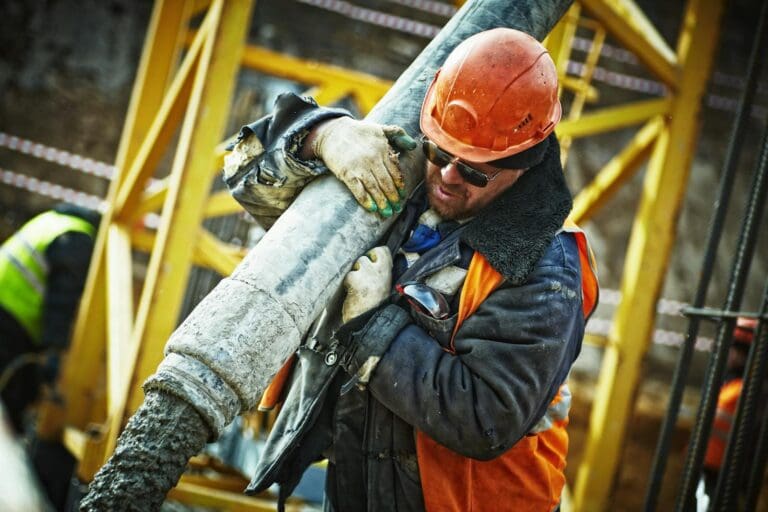Temp construction staffing involves hiring workers on a temporary basis to work on construction projects. It is an essential aspect of the construction industry as it provides companies with the flexibility to fill temporary labor shortages, respond quickly to project demands, and complete projects on time and within budget. This article will explore the various types of construction jobs, the factors affecting construction staffing, the benefits of temp staffing, how to choose a temp staffing agency, best practices for temp staffing, and the impact of industry trends.
Types of Construction Jobs
There are several types of construction jobs, each requiring different levels of skill and expertise. Skilled tradespeople such as electricians, carpenters, and plumbers play a critical role in construction projects, while construction management, including project managers and supervisors, oversee the entire construction process. Engineers are responsible for designing and planning construction projects, while support staff, such as administrative assistants and project coordinators, provide necessary administrative support. Having a skilled and diverse workforce is essential for successful construction projects.
Factors Affecting Construction Staffing
Several factors can affect the need for construction staffing, including the project’s location, project scope, seasonal demands, budget constraints, and technology changes. Location can impact the availability of skilled workers in a particular area, while project scope can require the need for specific types of workers. Seasonal demands, such as increased construction during the summer months, can impact staffing needs. Budget constraints can limit the number of workers hired, and technology changes can impact the skillset needed for workers.
Construction Staffing Agencies
Construction staffing agencies can provide construction companies with temporary workers, allowing them to quickly fill labor shortages and meet project demands. However, there are pros and cons to using temp staffing agencies. Companies need to choose the right agency based on their needs, such as the agency’s reputation, industry expertise, compliance with laws and regulations, screening and hiring processes, and quality of customer service. Common services offered by temp staffing agencies include recruitment, screening, and hiring of workers, payroll management, and benefits administration.
Benefits of Temp Staffing
Temp staffing provides several benefits, including cost savings, flexibility, talent pool expansion and improved productivity.
Cost savings can come from not having to pay for benefits and training for temporary workers. Employing temporary workers can be less expensive than hiring permanent staff because companies do not need to pay for benefits and training for temporary workers. This can be especially beneficial for companies with fluctuating project demands. It also allows companies to manage their labor costs more effectively by only hiring workers when needed, rather than maintaining a full-time staff.
Flexibility allows companies to scale their workforce up or down based on project demands. Construction projects can be unpredictable, and the workforce needs can vary significantly from one project to another. By using temp staffing, companies can quickly scale their workforce up or down based on project demands. This flexibility allows construction companies to respond to changes in project timelines, budgets, and labor needs more efficiently.
Talent pool expansion is another benefit of temp staffing. Temp staffing agencies have access to a broader pool of skilled workers than construction companies might have access to on their own. This can be particularly valuable for companies working on specialized projects that require workers with specific skills or experience. Access to a wider pool of talent can help ensure that the right workers with the right skills are available to complete the project on time and to the desired quality.
Improved productivity comes from having the right workers with the right skills for a project. Having the right workers with the right skills for a project can help improve efficiency and productivity. This is particularly important in the construction industry, where completing projects on time and within budget is essential. By using temp staffing, construction companies can ensure that they have the necessary skills and expertise to complete projects successfully.
Types of Temp Staffing Arrangements
Temp staffing agencies offer several types of temp staffing arrangements, including temporary staffing, temp-to-perm staffing, seasonal staffing, project-based staffing, and independent contractor staffing. Temporary staffing involves hiring workers for a specific duration, while temp-to-perm staffing allows companies to test temporary workers for permanent roles. Seasonal staffing is used to fill labor shortages during seasonal demands, while project-based staffing is used for specific projects. Independent contractor staffing involves hiring workers as independent contractors, giving companies more flexibility in their workforce.
Retaining Construction Workers
One of the biggest challenges in the construction industry is retaining skilled workers. Companies can promote worker retention by creating a positive work environment, providing competitive salaries and benefits, and offering opportunities for growth and development. Building a culture of safety, respect, and teamwork can help create a positive work environment that fosters collaboration and mutual respect among workers. Offering competitive salaries and benefits can help attract and retain workers, while providing opportunities for growth and development can give workers a sense of purpose and career progression.
Temp staffing can also be an advantage in retaining construction workers. By using temp staffing, companies can quickly and efficiently fill labor shortages without having to overburden permanent workers. This can reduce burnout and increase job satisfaction among permanent workers. Additionally, temp staffing can provide workers with opportunities to gain new skills and experience, which can help increase job satisfaction and promote career growth. This can be particularly valuable for workers who are looking to gain experience in a variety of projects or work on specialized projects.
Retaining construction workers is essential for the success of construction companies. Companies can promote worker retention by creating a positive work environment, providing competitive salaries and benefits, and offering opportunities for growth and development. Temp staffing can also be an advantage in retaining construction workers by reducing burnout and providing workers with opportunities to gain new skills and experience. By using temp staffing strategically, construction companies can create a more stable and satisfied workforce.
Diversity and Inclusion in Construction Staffing
Diversity and inclusion are critical components of any workforce, including the construction industry. A diverse and inclusive workforce can help companies build stronger relationships with the communities they serve, improve creativity, and provide equal opportunities to all workers. However, there are barriers to achieving diversity and inclusion in construction staffing, including bias and stereotypes, lack of access to training and education, and limited outreach to underrepresented groups.
One of the best practices for promoting diversity and inclusion in construction staffing is to establish clear diversity and inclusion goals. These goals should be communicated to all employees and stakeholders, and progress towards these goals should be tracked and evaluated regularly. This can help companies stay accountable and focused on their diversity and inclusion efforts.
Another best practice is to provide training and education for employees on topics related to diversity and inclusion. This can include training on topics such as unconscious bias, cultural awareness, and inclusive language. By providing employees with this type of training, companies can help create a more inclusive work environment where all employees feel valued and respected.
Implementing fair hiring practices is another essential best practice for promoting diversity and inclusion in construction staffing. This can include reviewing job descriptions to ensure that they are inclusive and do not include language that may deter underrepresented groups from applying. It can also involve removing any unnecessary requirements that may create barriers for certain groups of workers, such as language proficiency or certain certifications. Additionally, companies can make a concerted effort to recruit from underrepresented groups by partnering with community organizations and outreach programs.
Industry Trends in Construction Staffing
Several industry trends are transforming the construction staffing landscape. Technological advancements are one of the most significant trends impacting construction staffing.
Technological advancements have significantly impacted the construction industry, and workers must adapt to new technologies to remain competitive. One of the most significant technological advancements in construction is the use of building information modeling (BIM) software. BIM allows workers to create detailed, three-dimensional models of buildings and structures, which can help improve accuracy, reduce waste, and increase efficiency in the construction process. Workers must be trained in the use of BIM software to be effective in the industry.
Another technological advancement that is transforming the construction industry is the use of drones. Drones can be used to perform inspections, survey sites, and monitor construction progress from a bird’s-eye view. This technology can improve efficiency and reduce the time and cost of inspections and surveys. However, workers must be trained in the use of drones and be aware of the safety considerations when operating them on construction sites. In addition to BIM and drones, there are several other technological advancements, such as 3D printing and augmented reality, that are becoming more prevalent in the construction industry. Workers who are trained in these technologies will be better equipped to succeed in the evolving construction landscape.
Companies need to invest in training and development to ensure that their workforce is up-to-date with the latest technological advancements.
Another industry trend that is impacting construction staffing is changes in workforce demographics. The aging workforce and increased diversity are affecting the types of workers needed and the recruitment strategies used. With many skilled workers nearing retirement age, it is essential for companies to attract and retain younger workers to fill the talent gap. Additionally, increasing diversity within the workforce can lead to better collaboration, improved creativity, and a stronger sense of community within the company.
The rise of green construction jobs is another trend that is creating new opportunities for workers with sustainable building skills. With the growing concern over climate change, many companies are focusing on sustainable building practices. This has led to an increase in demand for workers with skills in areas such as renewable energy, energy efficiency, and sustainable materials. As a result, companies may need to consider adjusting their recruitment strategies to attract workers with these specialized skills.
How to Choose a Temp Staffing Agency
Choosing the right temp staffing agency can be a critical decision for construction companies. One of the most crucial factors to consider when selecting a staffing agency is their experience and reputation. Companies should research the agency’s history, including their track record of successful placements and customer satisfaction. Checking references and reviews from previous clients can provide valuable insight into the agency’s reliability and quality of service.
Industry expertise is another factor to consider when choosing a temp staffing agency. Construction companies should look for agencies that have experience and knowledge in the construction industry, including familiarity with industry-specific regulations, certifications, and safety standards. An agency with industry expertise can provide workers who have the necessary skills and experience to complete construction projects effectively.
Compliance with laws and regulations is another essential factor to consider when selecting a temp staffing agency. The agency should be fully licensed and insured, and their screening and hiring processes should be in compliance with all applicable laws and regulations. This includes conducting thorough background checks, drug testing, and verifying workers’ legal status.
Screening and hiring processes are also critical considerations when selecting a temp staffing agency. Companies should look for agencies that have rigorous screening and hiring processes in place to ensure that they are providing reliable and skilled workers. This includes verifying workers’ qualifications, checking references, and conducting thorough interviews to assess their experience, skills, and work ethic.
Quality of customer service is another essential factor to consider when selecting a temp staffing agency. Companies should look for agencies that have excellent communication skills and are responsive to their needs. The agency should be able to provide workers quickly and efficiently, respond to any concerns or issues promptly, and provide ongoing support throughout the project.
Best Practices for Temp Staffing
Temp staffing is a crucial solution for construction companies to fill labor shortages quickly and efficiently. However, to maximize the benefits of temp staffing, companies need to follow best practices that help them get the most out of their temporary workers.
One of the essential best practices for temp staffing is to ensure clear communication and established expectations. By clearly communicating the worker’s roles and responsibilities and setting expectations for their work, companies can prevent confusion and ensure that workers are aligned with the company’s goals and objectives.
Effective training and onboarding are also critical for temp staffing success. Companies should provide workers with the necessary training and tools they need to succeed in their roles. This can help ensure that workers are equipped with the skills and knowledge they need to perform their jobs efficiently and safely.
Regular feedback and performance evaluations are another important best practice for temp staffing. Companies should provide workers with regular feedback on their performance, which can help them improve and feel valued. Performance evaluations can also help companies identify areas for improvement and develop plans for addressing them.
Finally, building strong relationships with staffing agencies is essential to ensure that companies can quickly and efficiently fill labor shortages. Developing strong relationships with staffing agencies can help companies access a broader pool of workers with diverse skills and backgrounds. Additionally, strong relationships can help companies get the workers they need quickly, reducing downtime and increasing efficiency.
Conclusion
Temp construction staffing is essential for construction companies to meet project demands, fill temporary labor shortages, and complete projects on time and within budget. Companies should consider the various types of construction jobs, factors affecting construction staffing, the benefits of temp staffing, and industry trends when choosing a temp staffing agency and implementing best practices for temp staffing. Promoting diversity and inclusion in construction staffing is essential for building a skilled and diverse workforce that reflects the communities they serve.















